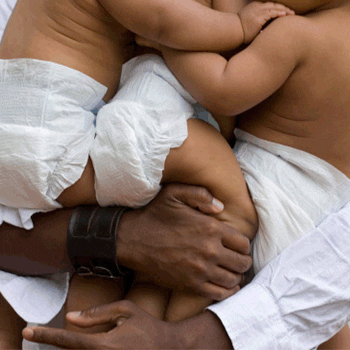AWHONN thanks its partner, Huggies, for support of this content in the Diapering Zone.
Change is good when it comes to diapers that can help prevent diaper rash!
‘While it seems like the choice between paper or plastic started in your grocer’s checkout lanes, the great diapering debate has been going on for quite some time. With diapering, there are a whole lot of choices when it comes to providing your baby with a wearable, portable potty until they can take care of business for themselves.
Google “diaper blogs” and you get more than 2 gazillion results; okay, well it’s really like a little more than 2 million results, but still! All of that talk basically boils down to choosing among three types of diapers: super -absorbent disposable, cloth, hybrid/green, or some combination thereof.
Every family is different, and that’s good news because that means with so many choices there’s likely a diaper just for you and your little one’s bum.
Disposable v. cloth?
Experts now agree super-absorbent disposable diapers are preferred to cloth when it comes to diaper recommendations for baby’s bum. That’s thanks to the protective advances in diapering technology—everything from super high-absorbent materials, wetness indicators, moisture-wicking properties to keep baby’s skin dry to emollients like aloe to protect baby’s skin from irritants. Unlike cloth diapers, the moisture-transporting capabilities of disposable diapers and diaper shell inserts may help prevent diaper rash in some infants, research demonstrates.
If you’re comparing costs, say experts at ConsumerSearch, a diaper service comes in at about the same as buying and laundering your own cloth diapers. When it comes to the disposable categories, most makers offer mega boxes that help with cost savings, and most parents can now find choices among chlorine-free disposable options for about the same price. In the hybrid category, parents get a disposable liner that fits into a washable outer shell.
Exploring your options
Whatever type of diaper you choose, you are going to need a lot of them – a baby goes through several thousand diapers from the time he’s born until he’s fully potty trained. Look for the following features:
-
- A foldable waist or notch area to keep the diaper away from baby’s umbilical area
- Elastic or gathers at the waist and legs for the best fit (read leakproof!)
- An absorbent core that wicks moisture from baby’s skin
- A soft natural outer shell or cover
- Easy, adjustable fasteners
Cloth |
Disposable |
Hybrid/Green |
| It may seem cheapest to use cloth diapering, but as technology has improved disposable diapers, experts no longer recommend cloth diapers, which expose baby’s skin to irritants, including urine or stool. | Invented more than 60 years ago, today’s disposable diapers can help prevent diaper rash with their super-absorbent cores, breathable outer layers and wetness indicators that work together to keep moisture away from baby’s skin. | The best of these combine the convenience of a disposable (some even flushable!) inner liner with a cloth outer wrapper that looks more like clothing than a diaper. |
| Average $2 per “one size” cloth diaper. | $0.25-0.40 cents each. | Average $12 for an outer shell; $0.40 Fper disposable liner. |
Find more practical diapering tips from our partner, Huggies, at this link.
AWHONN thanks its partner, Huggies, for support of the Diapering Zone.
For more everyday diapering tips, visit resources from our partner, Huggies.
DID YOU KNOW that one in three families do not have all the Diapers they need to keep their youngest clean, dry and healthy? Click on DIAPER DRIVE where you can both donate diapers to families in your community or receive diapers from your local diaper bank.








Comments are closed.